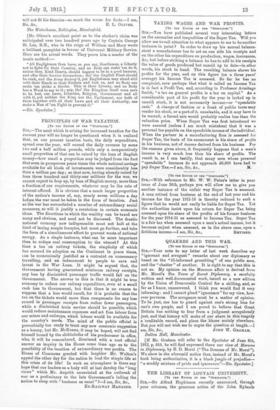PRINCIPLES OF WAR TAXATION.
LTO TIIE EDITOR 07 TOR " talP/ICTITOR."] Sin,—The need which is arising for increased taxation for the current year will no longer be questioned when it is realized that, on our present taxation basis, the daily expenditure, spread over the year, will exceed the daily revenue by some two and a half million pounds, while only a comparatively small proportion of that can be raised by the loan of English money—how small a proportion may be judged from the fact that even in prosperous peace times the whole national savings available for all kinds of investments were considerably less than a million per day; so that now, having already raised by loan three hundred and thirty-one millions for the war, we cannot expect to keep up, by loan of English money, more than a fraction of our requirements, whatever may be the rate of interest offered. It is obvious that a much larger proportion of the nation's income of, say, nearly seven millions a day before the war must be taken in the form of taxation. Just as the war has necessitated a number of extraordinary social measures, so will it justify a revolution in certain economic ideas. The directions in which the wealthy can be taxed are many and obvious, and need not be discussed. The drastic national economy now indispensable must not halt at the limit of taxing simple luxuries, but must go further, and take the form of a simultaneous effort to prevent waste of national energy. As a single instance, what can be more important than to reduce coal consumption to the utmost P At this time a tax on railway tickets, the simplicity of which has secured its adoption on the Continent in peace times, can be economically justified as a restraint on unnecessary travelling, and an inducement to people to save and invest in the War Loan. It might be argued that, the Government having guaranteed minimum railway receipts, any loss by diminished passenger traffic would fall on the Government. The answer to this is that it might be true economy to reduce our railway expenditure, even at a small cash loss to Government, but that there is no reason to suppose that a loss would result, for it is probable that the tax on the tickets would more than compensate for any loss caused in passenger receipts from rather fewer passengers, while a diminished train service should be possible, which would reduce maintenance expenses and set free labour from our mines and railways, which labour would be available for the country's needs. The mind of the public official is proverbially too ready to treat any new economic suggestion as a heresy, but Mr. McKenna, it may be hoped, will not find himself bound by the shibboleths of his predecessor in office, who, it will be remembered, dismissed with a curt official answer an inquiry in the House some time ago as to the possibility of the taxation of extraordinary war profits. The House of Commons greeted with laughter Mr. Walton's appeal the other day for the nation to lead the simple life at this crisis of its life! In such an atmosphere is there any hope that our leaders as a body will at last develop the "long views" which Mr. Asquith enunciated at the outbreak of war as a preliminary to the late Government's lulling the nation to sleep with " business as usual " P—I am, Sir, &c.,
EX-RAILWAY MANAGER.










































 Previous page
Previous page